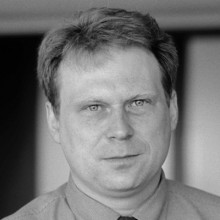Polish literature

Piotr Siemion
(born 1961) writes fiction, translates from English, and is a successful lawyer by day. He studied English at Wrocław University. In 1998 he left for the United States, where at Columbia University he wrote and defended his doctorate on the American twentieth-century novel, and studied law. Since 2000 he has lived in Poland again
So far Piotr Siemion has only written one, highly acclaimed novel, Low Meadows (2000). Written with imagination and humour, it is an impressive novel about the generation of Poles born in the early 1960s, who entered adulthood in the years of “the great change”. The novel has a three-part structure that parallels the three stages in the life story of this generation. In the first part we see the heroes in Poland in the second half of the 1980s, an era of non-compulsory anarchy, decadence in the shadow of declining communism. The second part covers several years spent in emigration, and finally in the third part the heroes return to Poland, which has just set off on the road to capitalism. As Piotr Śliwiński wrote about this novel, “It’s not an artistic revolution, or a report aimed at a handful of people who hold the magic key to the latest art form, but something to read that grabs hold of you and makes you hungry for more – it’s witty, moderately perverse, and deeply, but not insistently ironical." "When I publish a novel, my credibility as a lawyer suffers, because it turns out that I am also some sort of – excusez moi le mot – artist. On the other hand, artists find me extremely suspect for being a lawyer; no one’s sure I don’t pay someone to write my books for me. But I think it’s a great joke that these two worlds are in conflict, because I end up having two identities, though it’s nothing like schizophrenia. One of my worlds feeds on the other." (Piotr Siemion) "You can only see what’s really happening to Poland nowadays at the points where the big money and the big emotions clash, where new people are writing new biographies for themselves. The novel as a genre developed out of observation of the capitalist city pulsating with life. That’s how it was in England and France two hundred years ago, and that’s how it is today."
BIBLIOGRAPHY
- Niskie Łąki (powieść), Warszawa: W.A.B., 2000.
- Finimondo (powieść), Warszawa: W.A.B., 2004.
TRANSLATIONS
German:
- Picknick am Ende der Nacht [Niskie łąki], Berlin: Volk und Welt, 2000.
Hungarian:
- Éjszakai piknik [Niskie łąki], Budapest: Európa Kvk., 2002.